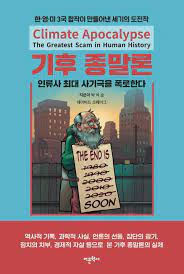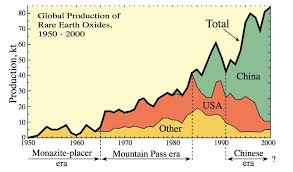Friday blog
This is a fairly inconsequential story, so I’ll just leave it up for one day. I’ll be back to� more serious stuff at the weekend.
How I became an ‘expert’
Regular readers will know that my climate book has recently been published in South Korea:
Sales have been a bit slow, so I’ve started writing some articles based on the book that I hope the university professor who adapted my book for the Korean market can place in Korean media to help push sales.
One idea I had was to adapt a recent blog I wrote about how the move from petrol cars to electric vehicles is going to destroy hundreds of thousands of jobs throughout Western economies:
But to write this article, I needed to know how many cars the Korean auto industry produces each year and how many people work in the Korean auto industry.
My first thought was to get in touch with my Korean contact and ask him. But then I thought of Google. It took me less than three minutes on Google to get all the information I needed for my article.
Twenty or so years ago, a journalist would have had to have some knowledge of the area they were reporting on. But now with Google, anybody can write articles or even books without any knowledge at all. They just need a couple of ideas and Google will do the rest. Suddenly everyone can be an expert in everything.
I’m sure that somebody much more intelligent than myself has said that Google is the greatest revolution in the availability of knowledge since the invention of the printing press. However, as the West commits economic, cultural and societal suicide with its interminable and utterly trivial culture wars, its ludicrous obsession with trying to deny that there are only two sexes, its self-flagellation over the supposed sins of colonialism, its guilt for its supposed institutional racism and its futile efforts to fight a non-existent Climate Crisis, one could be forgiven for wondering whether getting immediate access to all the world’s knowledge has made us any more knowledgeable.
Would you trust this survey?
One fun ‘fact’ I found while Googling was a claim by Greenpeace that 82% of South Korean auto workers believe that petrol cars should be banned by 2035 and 64% believe a ban should be introduced by 2030. I wonder how the question in this marvellous survey was phrased. Here are two of many possibilities:
- Petrol cars are polluting cities and increasing atmospheric CO2 which is causing a climate crisis. Do you think petrol cars should be banned?
- If petrol cars are replaced by electric vehicles, over 150,000 of South Korea’s 331,000 car workers will be unemployed. You’re possibly one of those who will lose their job. Do you think petrol cars should be banned?
I rather suspect that the question Greenpeace asked in their survey was closer to the former of these two possibilities and awfully far away from the latter.
My ‘expert’ article
Anyway, here’s the article I wrote given that three minutes on Google have now made me an expert in South Korean motor manufacturing:
How to wreck your car industry and destroy jobs
by Seok Pak and David Craig
South Korea’s automobile industry produces around 3,160,000 passenger cars a year making the country the fourth largest producer of passenger cars in the world as of 2021, overtaking Germany in terms of vehicle output.1 South Korea exports around 1,960,000 passenger cars a year making automotive manufacturing a key industry for the country. More than 331,000 people are employed.
It�s one of the most critical industries for any country wishing to have a healthy economy.
Like other advanced economies, Korean politicians are planning to ban the sale of petrol cars and replace them with electric vehicles in order for the country to meet its obligations to reduce CO2 emissions. An electric vehicle requires about 30 percent less work than a petrol-driven car as there are fewer complex moving parts. So that�s almost 110,000 of South Korea’s 331,000 car workers who won�t be needed in the glorious greener future our rulers have planned for us. In Germany, which produces around 3,100,000 cars a year, IG Metall, the German union for most of that nation�s autoworkers, estimates that 75,000 German jobs building engines and transmissions will be eliminated by 2030.2
Moreover, due to the high cost and impracticality of electric vehicles, many governments expect that there will be a reduction in car ownership of somewhere between 20 percent and 30 percent. That will mean a further drastic cut in the number of car workers in most advanced economies.
According to a survey conducted by Greenpeace and the Korean Metal Workers’ Union, more than 82 percent of employees in the industry believe vehicles with internal combustion engines should not be sold after 2035, while nearly 64 percent say a ban should be introduced by 2030.3 One could wonder whether those surveyed were aware of how many of them would be made unemployed by the switch to electric vehicles.
Then there is one further problem for car manufacturers worldwide – China has a virtual monopoly of the rare earth metals needed for our rulers� great green revolution:
Will the Chinese Communist Party (CCP) generously allow these rare earth metals to be exported so that other countries can make car batteries and all the other things needed to go green? Or will the CCP restrict exports of rare earth metals so that most of the manufacturing of car batteries and other key products required for the green revolution will be done in China?
The switch from petrol vehicles to electric vehicles is going to be catastrophic for the Korean car industry and will result in the loss of probably more than 150,000 jobs. Let us hope that Korean politicians have planned what all these soon-to-be-unemployed car workers will be doing to earn a living in the wonderful Net-Zero CO2 future that is being prepared for all of us.
Seok Pak and David Craig are authors of CLIMATE APOCALYPSE The Greatest Scam in Human History
1https://www.statista.com/statistics/226032/light-vehicle-producing-countries/
2https://edition.cnn.com/2019/12/04/business/electric-car-job-threat/index.html
3 https://www.aljazeera.com/economy/2022/4/14/south-korean-autoworkers-support-banning-polluting-cars-survey
















Sorry who cares what the workers think about this? Just do a Rishi and follow globalist orders by dressing up the UN plan as something different. Be economical with the truth as their job is to sell the plan not to think for themselves.
Car ownership will just be for the rich likewise plane travel. Our lives are going to be much smaller and confined. 15 minute cities with monopoly providers within walking distance or if you are lucky on a bike. Although as with all communism the products available will be so dreadful it will probably not be worth the long queue to buy it.
I�m not convinced that politicians have a clue what they are talking about when they say they want growth. JR Mogg has mentioned this recently pointing out that politicians talk about GDP but it is GDP/capita that matters and even that is an average. The difference between the two is very apparent in China. Politicians also talk about exports, but we need exports to pay for what we need to import. Growth is only going to happen when we have a positive balance of trade and when did any politicians talk about that. The only one I recall seeing the importance was Harold Wilson.
At nearly 79 I have never owned a car, only because I never liked driving. In my street quite a few houses don�t have a drive and there are cars parked everywhere that rarely move. There some houses where they have three cars. Some people don�t even use their drive, I suspect to prevent others parking outside their house. There is nothing attractive about living in this environment. How can car manufacturing be vital to the economy when they are hardly ever used? If they are used isn�t it because all the local shops have disappeared? It is the noise pollution from cars that is the worst aspect of them for me, including the music that some of them pump out. I suspect that if we did not have the welfare state and we had to provide for ourselves the car industry would have much less significance. The welfare state distorts all economic calculations. Then, if it is an important industry, we have the councils and government making driving as difficult and expensive as possible including parking, resulting in more journeys to soulless out of town shopping centres where parking is free.